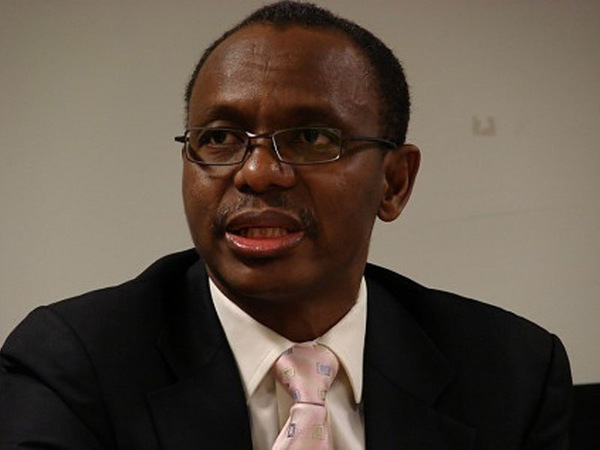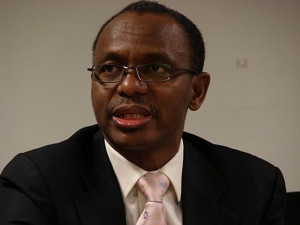Oil
NNPC: Nigeria should concentrate on taxes and royalties-El-Rufai

ABUJA-Governor Nasir El-Rufai of Kaduna State has called on the Nigerian Government to concentrate its efforts in the oil and gas sector on generating adequate taxes and royalties to run the system and stop owing the International oil companies (IOCs) especially with regards to the Joint Venture operating module.
The Governor who also called for the scrapping of the Nigerian National Petroleum Corporation and its replacement with a brand new organisation to ensure transparency and accountability in the oil and gas sector stated that the NNPC has outgrown and outlived its usefulness as currently structured noting that it had grown from a beautiful baby 38 years ago to a monster.
El-Rufia made the call as guest speaker at the 7th Wole Soyinka Centre Media Lecture series on Monday in Abuja, entitled: “Nigeria And The Oil Fortune.”
He said: “We should replace the NNPC with a brand new organisation fit for commercialised and corporatised national oil company and new industry regulators.
He added that government should review the Joint Venture strategy with the governing principle being to shift the financing and operational risks to the markets and operators respectively.
El-Rufaí said government should avoid owing the oil companies and should proactively review the terms and implementation of the Production Sharing Contracts and concentrate on collecting the royalties and taxes due to it.
“This new national oil company should be capitalised once and for all and then freed to fend for itself like other national oil companies do, seeking its financing independently from the financial markets and paying due taxes and royalties.
“The corruption and nonchalance that hobbled the NNPC are symptoms that its best days are over.
“We should give it a deserved funeral so that a new institution, active and nimble, can promptly replace it.”
According to El-Rufai, NNPC’s subsidiaries and associated companies can be reviewed, restructured and privatised or commercialised as appropriate consistent with national interest and objectives.
He said: “No one is better qualified to do this than the person that formed the NNPC through the merger of the Nigerian National Oil Corporation and the Ministry of Petroleum in 1977, President Muhammadu Buhari himself.
“No one can appreciate the gap between the vision of NNPC’s founding fathers, the beautiful baby of 1977 and the 38-year-old monster it has become than President Buhari.
“Something fundamentally decisive must be done to tame this monster and we must have the political will to make all oil industry transactions transparent.”
The governor said there should be clear rules and processes for licencing, concessioning, procurement and contracting, noting that the existing systems tend to be corrupt.
He said the President had already taken the commendable step of directing that all revenues be remitted either to the Federation Account or the consolidated revenue fund as required by sections 80 and 162 of the Constitution.
He added that the President was clear that oil industry revenues would no longer be treated as some slush fund of the Federal Government.
Oil
NNPC Targets 60% Methane Emission Reduction By 2031
The Nigerian National Petroleum Company Limited (NNPC) has unveiled a bold strategy to reduce methane emissions in the oil and gas sector by 60% by 2031, with an ultimate goal of achieving net-zero emissions by 2060.
This announcement reinforces Nigeria’s leadership role under the Global Methane Pledge initiative and its commitment to tackling climate change.
The Group Chief Executive Officer of NNPC, Mele Kyari, disclosed these plans during a meeting on Thursday with Robert Leahman, the U.S. State Department’s Global Methane Program Manager, and a delegation from Deloitte.
READ MORE: Atiku Gloats Over AUN’s Achievements Ahead Of 20th Anniversary
The discussions, held at the NNPC Towers in Abuja, focused on collaborative efforts to reduce methane emissions through innovative and sustainable practices.
“Reducing methane emissions is not just an environmental necessity but also a strategic imperative for Nigeria’s energy transition. We are leveraging partnerships to adopt global best practices and innovative solutions,” Kyari stated.
Key among these efforts is a pilot project in the Niger Delta, aimed at establishing emissions baselines, mitigating methane leaks, and promoting sustainable operations across Nigeria’s energy sector.
The project, a partnership between NNPC, Deloitte, and the U.S. Bureau of Energy Resources, will utilize data-driven methodologies to pinpoint and address methane hotspots.
Robert Leahman commended Nigeria’s proactive stance, describing it as a benchmark for other nations on the continent.
“Nigeria’s leadership under the Global Methane Pledge sets a standard for the continent. These initiatives will not only help reduce emissions but also drive sustainable development in the energy sector,” he said.
Kyari highlighted the broader benefits of addressing methane emissions, noting its significance for both environmental protection and economic efficiency.
“This collaboration is a game-changer. By addressing methane leaks, we’re reducing waste, saving costs, and protecting the environment. It’s a win-win for our economy and the planet,” he added.
Oil
FG Introduces New Incentives To Revitalize Nigeria’s Oil & Gas Industry
In a strategic move to revitalize Nigeria’s oil and gas sector, the Federal Government has unveiled two key fiscal incentives aimed at attracting investment and enhancing energy security.
The announcement was made by Mr. Wale Edun, the Minister of Finance and Coordinating Minister of the Economy on Wednesday.
The first initiative, the Value Added Tax (VAT) Modification Order 2024, introduces critical exemptions for essential energy products and infrastructure, including Diesel, Feed Gas, Liquefied Petroleum Gas (LPG), Compressed Natural Gas (CNG), Electric Vehicles, Liquefied Natural Gas (LNG) infrastructure, and Clean Cooking Equipment.
Read Also: Atiku Calls For Rotational Presidency Across Nigeria’s Geopolitical Zones
These exemptions are designed to reduce living costs for Nigerians, promote energy security, and accelerate the transition to cleaner energy alternatives.
The second initiative, the Notice of Tax Incentives for Deep Offshore Oil & Gas Production, offers new tax relief options for deep offshore exploration projects.
This measure aims to position Nigeria’s deep offshore basin as a premier destination for international oil and gas investments, boosting the country’s appeal to foreign investors.
These reforms are part of a broader set of policy initiatives, known as Policy Directives 40-42, endorsed by President Bola Ahmed Tinubu.
The directives reflect the administration’s commitment to fostering sustainable development in the energy sector and enhancing Nigeria’s competitive edge in the global oil and gas market.
Business
Tinubu set to approve ExxonMobil-Seplat oil deal, expands CNG bus initiative

By Yemie Adeoye
NIGERIA’s President Bola Tinubu has announced that the protracted ExxonMobil-Seplat upstream oil divestment will be formally approved by the Minister of petroleum within a matter of days, just as he announced his government’s intention to expand the Compress natural Gas, CNG buses initiative.
The President who stated this during his Independence day nationwide broadcast stated that the move is in line with his administration’s commitment to free enterprise, free entry and free exit in investments which is the hallmark of his administration investment policy.
“Fellow compatriots, our administration is committed to free enterprise, free entry, and free exit in investments while maintaining the sanctity and efficacy of our regulatory processes. This principle guides the divestment transactions in our upstream petroleum sector, where we are committed to changing the fortune positively. As such, the ExxonMobil Seplat divestment will receive ministerial approval in a matter of days, having been concluded by the regulator, NUPRC, in line with the Petroleum Industry Act, PIA. This was done in the same manner as other qualified divestments approved in the sector.”
The President also seized the opportunity to plead with Nigerians to be patient with his administration’s reform policies. “As your President, I assure you that we are committed to finding sustainable solutions to alleviate the suffering of our citizens. Once again, I plead for your patience as the reforms we are implementing show positive signs, and we are beginning to see light at the end of the tunnel”.
“Our energy transition programme is on course. We are expanding the adoption of the Presidential Initiative on Compressed Natural Gas for mass transit with private sector players. The Federal Government is ready to assist the thirty-six States and FCT in acquiring CNG buses for cheaper public transportation.
Fellow Nigerians, while we are working to stabilise the economy and secure the country, we also seek to foster national unity and build social harmony and cohesion. Our economy can only thrive when there is peace”. he enthused.



















